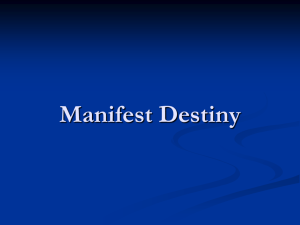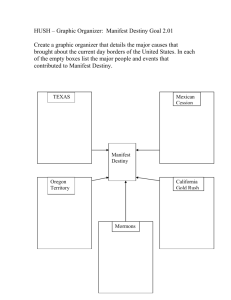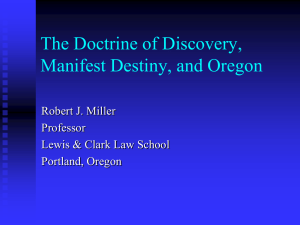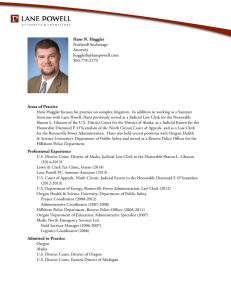Manifest Destiny
advertisement
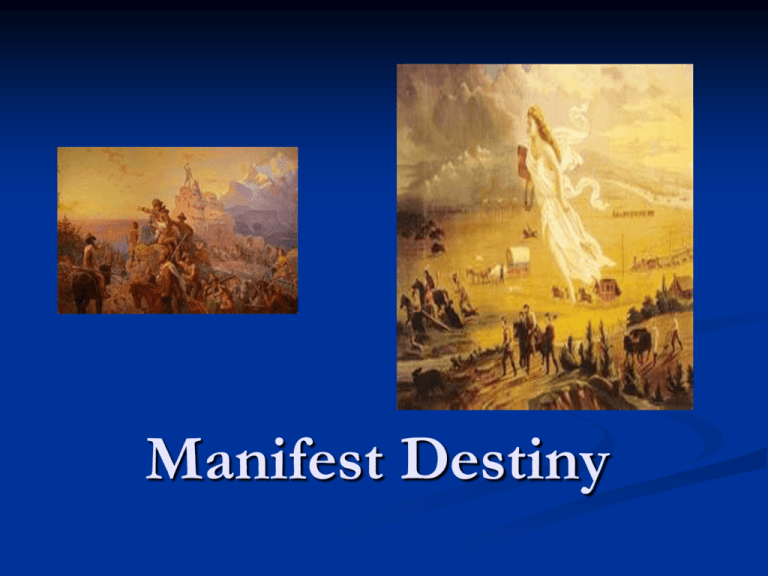
Manifest Destiny Elbow Room http://www.youtube.com/watch?v=nfCKd5b WnLE&feature=related Early Exploration: The Lewis and Clark Expedition, 1804-1806 In 1803, President Jefferson secretly asked Congress to commission an exploratory expedition across the western United States. The Corps of Discovery, led by Meriwether Lewis and William Clark, was the first overland expedition to the Pacific coast and back. Jefferson's vision was of expanding the "empire of liberty" and populating it with self-sufficient families and farmers. After Lewis and Clark, a number of other government-sponsored expeditions were initiated to ascertain the wild territories of the West. Lewis and Clark’s Route Manifest Destiny: The Ideology of Expansionism Americans grappled with the question of what to do with the Mexican and Native American people to be displaced by migration. The US risked conflict with nations that had claim to land in North America. Some desired the capacity for expanded trade with Asia, others were compelled to spread "civilization" and Christianity. Southern Democrats supported the addition of agrarian territories, while Northern Whigs feared the expansion of slavery. The belief that it was the nation’s Godgiven right to expand according to its needs was encompassed in the slogan, "Manifest Destiny.” Manifest Destiny http://www.youtube.com/watch?v=YLmUhT9 QOlE President Polk and Westward Expansion During the presidential campaign of 1844, Democratic nominee James K. Polk called for American expansion westward. He interpreted his election, though he only won by a narrow margin, as an endorsement of his expansionist position. In his inaugural address (1845), he spent considerable time defending U.S. expansion as a means of creating and preserving a more powerful Union. The Overland Trails Wagon ruts from the Oregon Trail, visible today in Idaho The seven month, 2,000 mile journey from Missouri to the coast was expensive and hazardous. Though many travelers were anxious about the possibility of conflict with Native Americans, the most deadly hazards to travelers were accidents and disease. Life on the trail was tedious, with each wagon moving at a pace of about 15 miles per day. Oregon was the major destination of migrants until 1848, when the discovery of gold in California diverted the stream of settlers southward. The Overland Trails The U.S. expanded rapidly in the nineteenth century A Stop Along the Trail http://www.youtube.com/watch?v=EY5RN6scec&feature=related Oregon Country Beginning in 1818, Britain and the United States jointly occupied Oregon Country. Oregon's population of British, French, Native American, and Hawaiian trappers and entrepreneurs frequently formed mixed-race families until the 1840's. When "Oregon fever" swept thousand of white Americans into the Willamette Valley, the new settlers adopted polices that excluded non-white emigrants. The Oregon Treaty of 1846 established the border between Canada and the U.S. at the forty-ninth parallel, despite President Polk's 1844 campaign slogan, "Fifty-four Forty, or Fight!" Oregon became a state in 1859. California: The Golden State The U.S. acquired California from Mexico in 1848 with the Treaty of Guadalupe Hidalgo. California attracted people from all over the U.S. and the world with the discovery of gold later that year. Merchants who came to outfit, house, feed and entertain the exploding population had a better chance of profiting than those who came to pan the streams and rivers. Most miners were young men. The transitory mining camps were often rife with crime. California became a state in 1850. Chinese Immigration During the Gold Rush Thousands of Chinese workers immigrated to California during the gold rush. Though it was one of the most ethnically diverse regions of the country, the Chinese were subject to discrimination. They were relegated to doing the most menial labor. In 1852, they became subject to a tax on foreign miners. In 1882, Chinese immigration was outlawed with the Chinese Exclusion Act. The California Gold Rush http://www.youtube.com/watch?v=gDkqvqqj MAA Territorial Expansion, 1830-1860 1830 Territorial Expansion, 1830-1860 1850 Territorial Expansion, 1830-1860 1860 http://www.youtube.com/watch?v=Qrjg9ulRxo&feature=related
